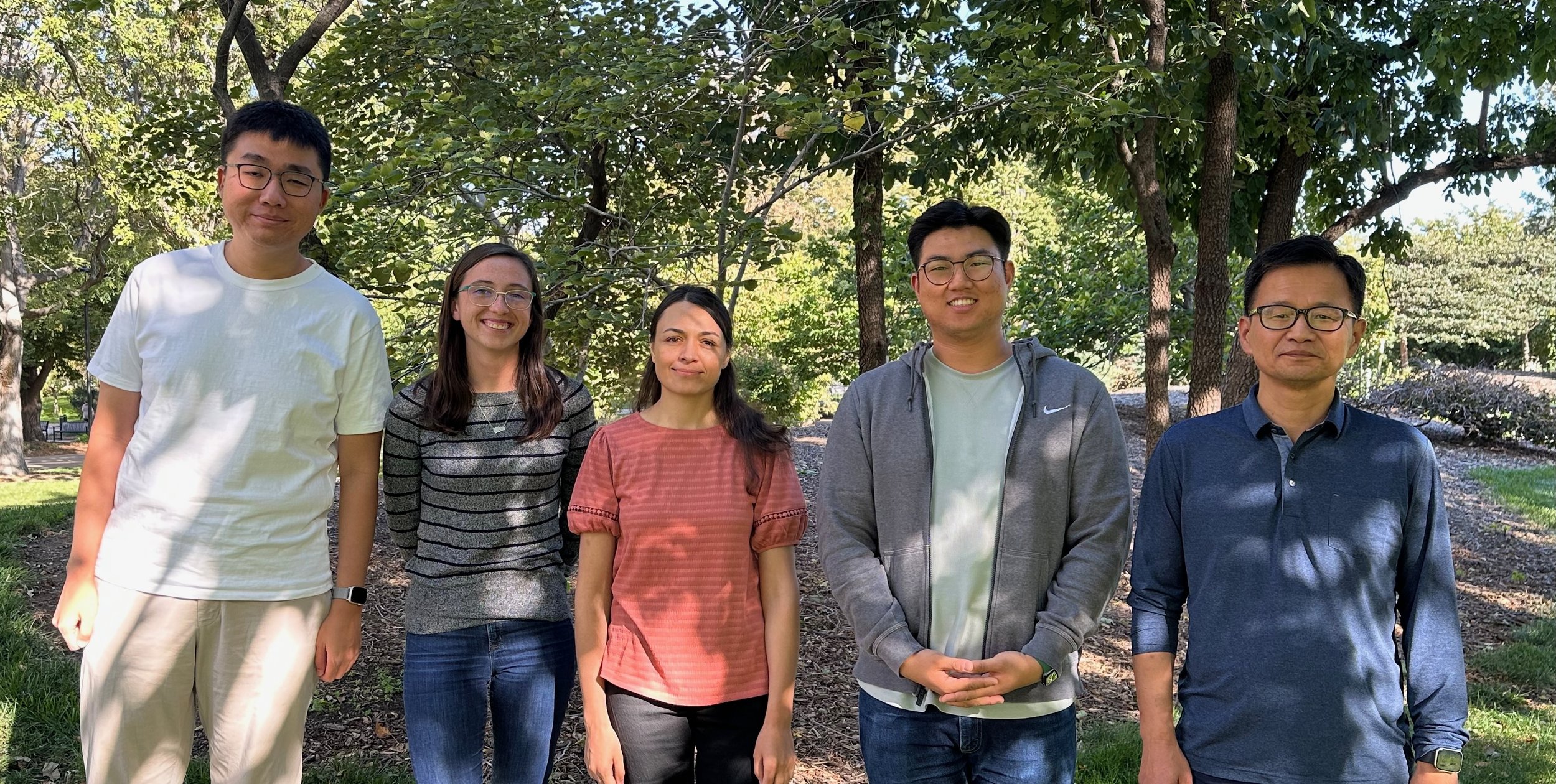The Human-Environment Systems, Interactions, Impacts, and Intelligence (HESI) Lab
Members of our Graduate Research Lab, as of Fall 2023. Left-to-right: Chang Li, Emmi Berski, Uzma Jabeen, Kwang-il (Jason) Yoo, Iksoon Choi. Not pictured: Kyle Tredinnick
Our team
The Human-Environment Systems, Interactions, Impacts, and Intelligence (HESI) Lab is made up of PhD, Master’s, and undergraduate students interested in working on complex socio-environmental issues. Our research focuses on applying spatial modeling, simulation, and scenario analysis to investigate how land use practices, governance structures, and environmental change influence water quality and social-ecological resilience, with the goal of supporting adaptive management strategies. While we specialize in quantitative approaches, we also recognize the pressing socio-environmental issues of our time cannot be fully addressed by a single methodology or even discipline. Accordingly, our work employs a range of methods to answer policy-relevant research questions.
Current students (at Kent State)
Uzma Jabeen is a PhD student in the Geography Department at Kent State University. She started her academic journey with a bachelor’s degree in Environmental Science and a master’s degree in Integrated Water Resources Management. After completing her bachelor’s degree, she worked as an intern at Focus Humanitarian Assistance, a non-governmental organization in Pakistan, where she became interested in community vulnerability and disaster management. She also had the opportunity to participate in an exchange program at the University of Utah during her master's degree. During this program, she did not only take courses but also gained experience in cross-cultural teamwork. This experience, along with her passion for disaster management, motivated her to pursue a doctoral degree in this field. She recently transferred to Kent State University, where she is completing her coursework and working on her dissertation research. Her research focuses on social vulnerability to coastal inundation in the Chesapeake Bay Region.
Jason Yoo is a PhD student in the Geography Department at Kent State University. He earned his master’s degree in Geographic Information Science and bachelor’s degree in Environmental Studies. His research revolves around GIScience and socio-environmental systems, strongly emphasizing understanding problems regarding water quality, water governance, and land use by exploring spatial and temporal data by harnessing GeoAI and machine learning algorithms. He is also passionate about geo-visualization. In particular, he creates web maps for environmental, human, and Health-related topics to let people easily access and understand the complex dataset. He is also interested in bicycle and pedestrian safety by utilizing location-based services, regional walkability, and crash data.
Former students
Emmi Berski earned her MA in Geography from UNL in May, 2024. Her master’s thesis research surveyed municipal planners to assess motivations and barriers to green infrastructure usage, concerns about climate change, perceptions of public opinion, and green infrastructure implementation in cities across the Midwest. Through this research, she investigated the relationship between planners’ perceptions of public climate change opinion and the strength of their motivations in developing green infrastructure regulations.
Chang Li is a Geography PhD student at UNL. He obtained his bachelor’s degree at UW-Madison in 2022 and master’s degree at University College London in 2023. He has continuously focused on studying geographic information systems, and his main research interest is in natural disasters and their influence on human socioeconomic status. Throughout his career, he has conducted several research projects ranging from land cover classification at the Lake Superior National Estuarine Research Reserve (NERR) to wildfire risk analysis in England. His most recent research will be focused on pedestrian and cyclist safety based on human mobility data in Nebraska.
Iksoon Choi is a PhD student in Geography at UNL. His research explores the accessibility barriers to (primarily health-related) services in rural settings. His ongoing work includes spatial analyses of transportation-based barriers to drug addiction treatment facilities in rural Nebraska.
If you are interested in working with us
First, read our code of conduct here.
A large part of success in graduate school comes down to “fit” among students, advisors, and the program. To help gauge whether our lab might be the right fit for you, I encourage you to review my CV and to read a few of my publications found here. The more closely our interests align, I will be better able to advise, mentor, and guide you towards success in graduate school. If you think our interests fit well, great! Send an email and we can start a conversation.
Funding and applying to graduate school
Funding for graduate studies at Kent State is competitive, with many of our students funded by teaching assistantships. Occasionally I will have openings for funded graduate research assistantships, which will be posted on this site and communicated via AAG and other appropriate listservs.
If you are interested in applying to the PhD or MA programs within the Geography Deparment at KSU, you can find the relevant details here. Applications are generally due in January, but please confirm with official sources. You are STRONGLY encouraged to reach out to potential advisors (e.g., me) via email prior to applying.
For undergraduate students
If you are a current undergraduate student interested in research, please contact me by email. We often have projects, many of which are funded, that can support your interests and growth.
